Dr. Carey Friedman, Associate Professor of Marine Science and Dr. LeAnn Whitney, Associate Professor of Oceanography, were recently awarded a $77,000 grant from the Maine Community Foundation in support of their research examining the relationship between PFAS in the marine environment and its presence in phytoplankton. Dr. Friedman and Dr. Whitney are conducting the research in collaboration with Dr. Jitka Becanova, Assistant Research Professor of Oceanography at the University of Rhode Island’s Graduate School of Oceanography.
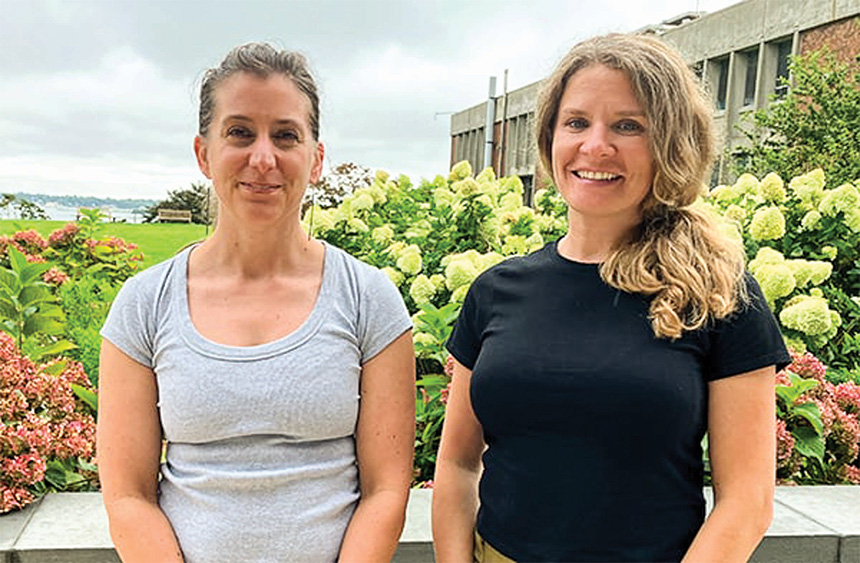
Dr. Carey Friedman and Dr. LeAnn Whitney tour the Atlantic Coastal Environmental Sciences Division of the Environmental Protection Agency
Research Context
Per- and polyfluoroalkyl substances (PFAS) are a group of thousands of synthetic chemicals used in a wide range of consumer products including water and stain resistant fabrics, personal care and cleaning products, non-stick surfaces, and paint products. Exposure to PFAS over time is associated with multiple adverse health outcomes including certain types of cancer, reproductive and developmental issues, and reduced immune and vaccination response in children.
PFAS are known as “forever chemicals” because the strength of their carbon-fluorine molecular bonds inhibits their natural degradation in the environment. Moreover, PFAS can bioaccumulate within aquatic organisms resulting in concentrations increasing up the food chain. Ultimately, Friedman and Whitney’s research will contribute to our understanding of the concentration of PFAS in local marine waters and how much transfers into phytoplankton, microscopic and photosynthetic organisms that form the base of the marine food chain.
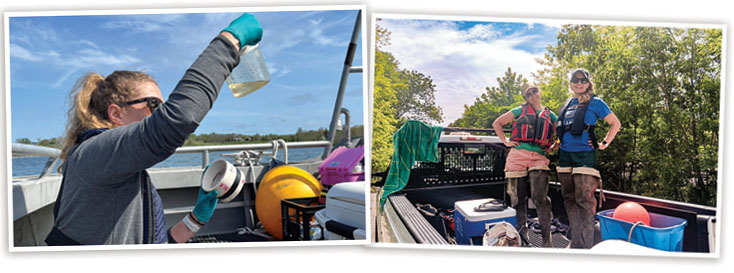
Dr. Carey Friedman and Dr. LeAnn Whitney spent the summer collecting water samples from the Penobscot Bay region.
There is a growing literature investigating the existence of PFAS in the environment, particularly freshwater, but PFAS contamination within the marine environment and its implications are not adequately understood, according to Friedman and Whitney. Friedman and Whitney are examining the relationship between concentrations of PFAS in coastal waters in relation to phytoplankton with implications for how the chemicals are able to move throughout the food chain and potentially accumulate in other organisms, some of which may be economically important for the state of Maine.
Research Methods
Using the waterfront resources at the Academy, Friedman and Whitney have sampled water and phytoplankton three times from each of nine test sites in Penobscot Bay and the Penobscot River this summer. The sites were chosen based on their proximity to effluent from wastewater treatment facilities and former mill sites that are currently used to release untreated landfill leachate directly into the water.
Friedman and Whitney are examining the relationship between concentrations of PFAS in coastal waters in relation to phytoplankton with implications for how the chemicals are able to move throughout the food chain.
Samples used to measure PFAS concentrations in the water were collected using two methods: direct sampling, which measures PFAS concentrations at the specific time of collection, and passive sampling, which measures average concentrations over time. The phytoplankton sample is collected by towing a net that concentrates particles suspended in the water column.
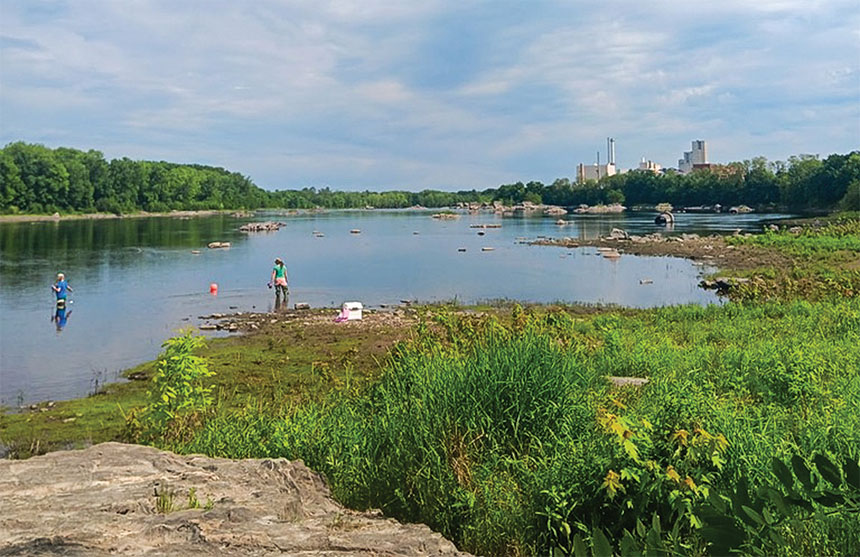
Taking samples from the Penobscot River with the Old Town mill in the background.
Once samples from Penobscot Bay and Penobscot River were collected in late June, they brought them to URI-GSO’s STEEP Center (funded by the Superfund Research Program, National Institute of Environmental Health Sciences), in early August. Their collaborator, Dr. Jitka Becanova of STEEP and GSO, has been analyzing the samples for the concentrations of 33 individual PFAS chemicals using a liquid chromatograph tandem mass spectrometer (LC-MS/MS). The forthcoming results will be shared with the community in a series of presentations shortly thereafter.
While at the GSO campus, Whitney and Friedman were able to participate in the first stages of the sample analysis process, give a talk focused on career choices to graduate students, and get a tour of the nearby Atlantic Coastal Environmental Sciences Division of the Environmental Protection Agency.
Principal Investigators
Dr. Carey Friedman teaches courses related to chemistry, pollution, and sustainability in the Ocean Studies Department. Friedman’s research focuses on how toxic chemicals are introduced and travel through the environment. She holds a B.S. in Chemistry from Trinity College, an M.S. in Environmental Toxicology from Cornell University, and a Ph.D. in Oceanography from the University of Rhode Island. Additionally, Friedman was a Postdoctoral Fellow at MIT.
Dr. LeAnn Whitney teaches courses in ocean studies, biology, and marine science. Whitney is a marine phytoplankton ecologist whose research focuses on identifying the cellular mechanisms employed by phytoplankton to persist in nutrient-poor environments. Whitney holds a B.S. in Marine Science from the University of Maine (Orono) and a Ph.D. in Cell and Molecular Biology from the University of Rhode Island and was a National Science Foundation Postdoctoral Fellow and Research Scientist at Bigelow Laboratory for Ocean Sciences.
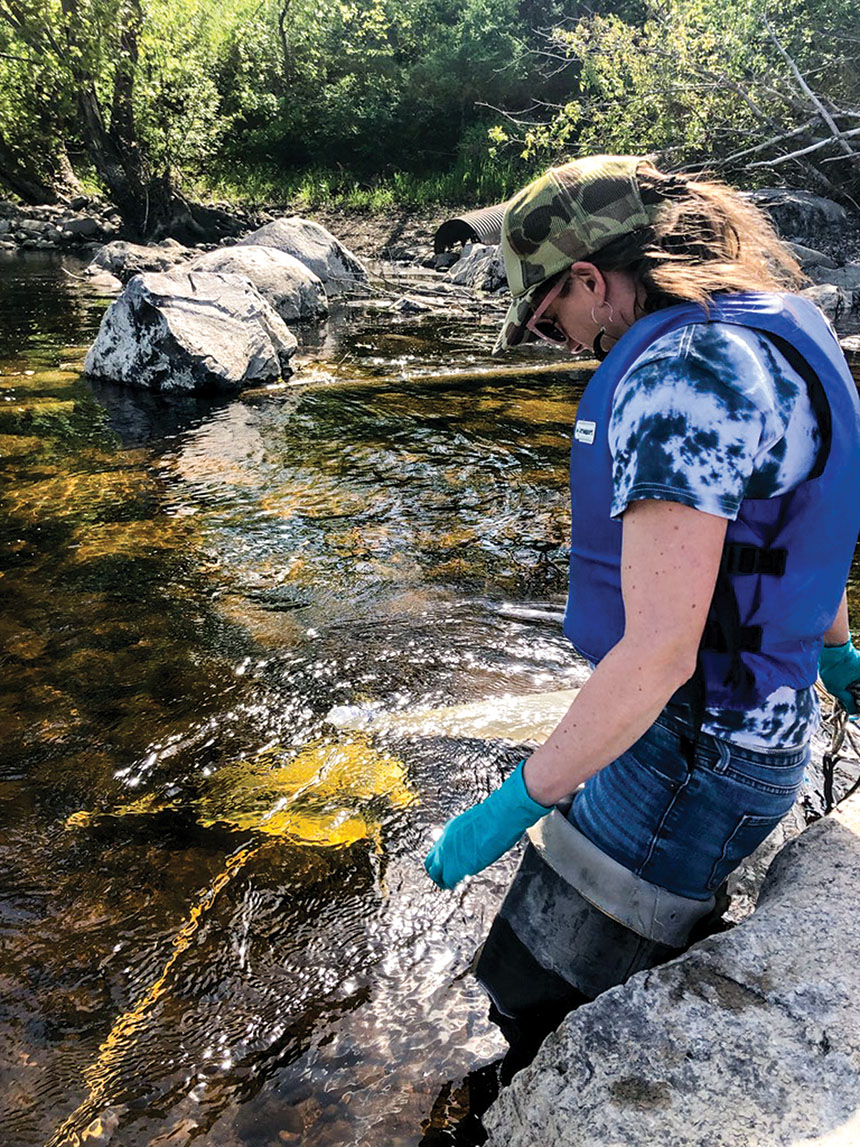
Dr. Carey Friedman in the Penobscot River
Friedman and Whitney’s collaborator, Dr. Jitka Becanova, Assistant Research Professor of Oceanography at the University of Rhode Island Graduate School of Oceanography, is an analytical chemist. Becanova’s research examines environmental contaminants, including PFAS, with the goal of reducing human exposure. She holds a Ph.D. in environmental chemistry from Masaryk University (Czech Republic).█
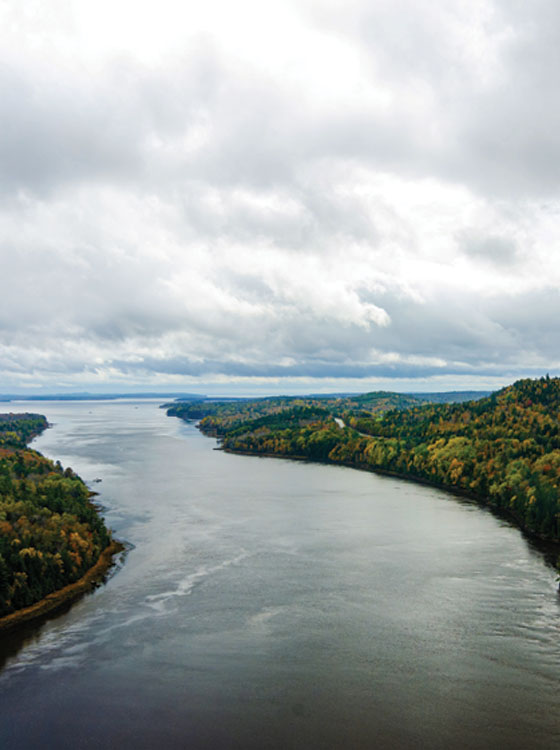
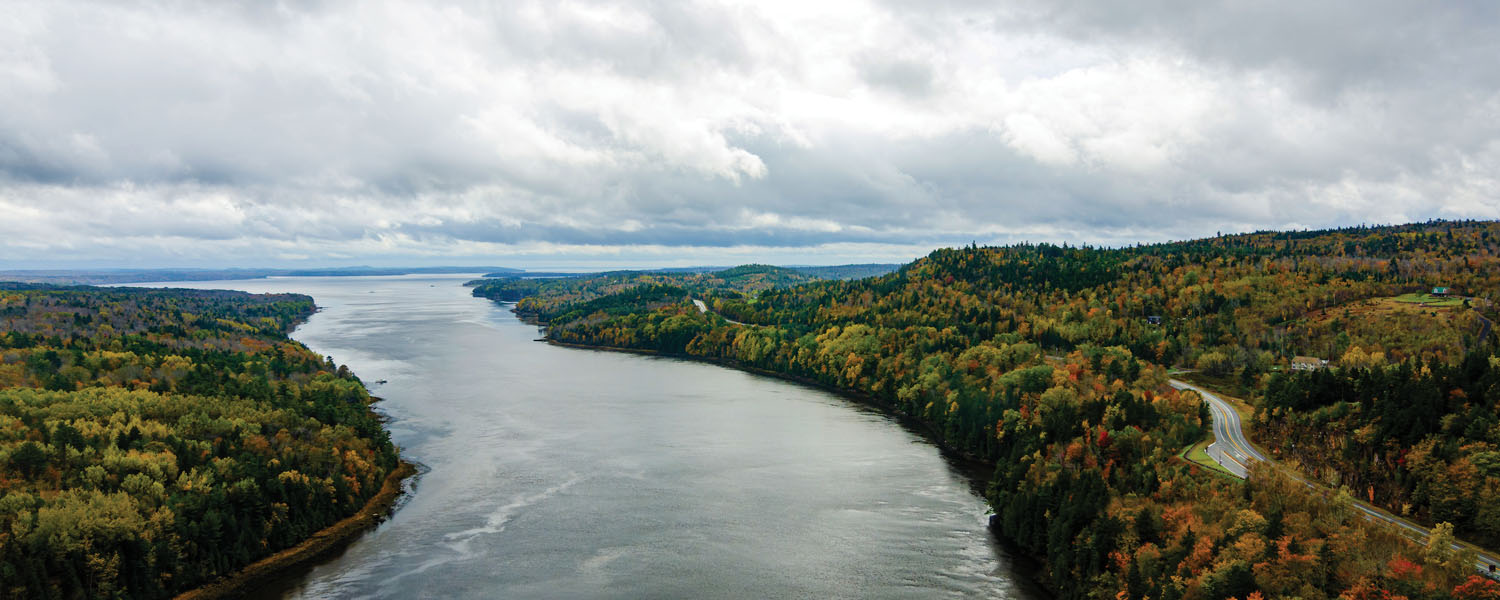



Post Comment
Comments are moderated and will be reviewed prior to posting online. Please be aware that when you submit a comment, you agree to the following rules:
Maine Maritime Academy reserves the right to delete any comment that does not comply with these guidelines and is not responsible or liable in any way for comments posted by its users. If you have a message for the editor, please email mariner@mma.edu.
Features
View All >Read More
Read More
Castine, Maine 04420All Rights Reserved © 2026
Privacy Policy & Terms
Web issue? Contact Webmaster